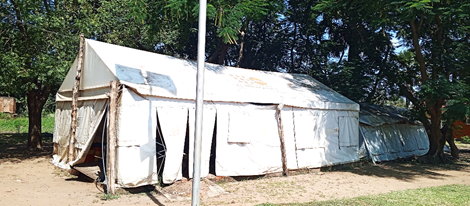YUMBE: DRDIP Supported Fish Pond Will Conserve Environment & Improve Household Income

Dodoronga Fish Pond being Constructed in Yumbe District
Apparent attempts by private individuals and businesses to reclaim
this spot and turn it around for construction of settlements have hit a dead
end owing to a strict watch from the line department of Environment at Yumbe District
Local Government. Swaibu Solo Andama the District Environment Officer said, the
district is on course to discourage dampening of this natural feature on
account of providing ecological balance.
In order to gain more from this stream, a disadvantaged but organized group
of 96(60f,36m) members are now introducing commercial fish farming at the
sideline of the wetland. They expect to produce fish for both internal and
external markets. The group is being supported through a World Bank funding of the
Development Response to Displacement Impacts Project(DRDIP) under the Office of
the Prime Minister.
The Dodoronga Fish Pond investment idea came from the Community members
who wrote a sub project proposal costed at Ugsh57 million and shared to DRDIP management
through the focal point persons at the district. On assessment by the technical
project team, the project was seen as viable and approved for funding, thus, Gulu
University Faculty of Agriculture was contracted as technical implementing
partner to support this community initiative.
Tiko Kasim Noah, the group Chairperson Project Management
Committee(CPMC) who offered a piece of land adjacent to the stream said the
group is determined to create wealth out of fish farming. Rukia Chandiru, a
group member noted that the fish Pond project will boost their group savings
and enable members to support their children in school besides settling other household
requirements. Another group member, Zaitun
Ijovi, shares the same aspiration as Chandiru, adding that she will be able to
start up her family business after receiving savings emanating from sales of
fish.
Gerald Degu Iwe, the Aquaculture Research Scientist and Technical Field
Coordinator who represents Gulu University in this project site said the Pond
measures 640 Square meters (36 by 20 meters). It is anticipated to accommodate up
to 6,400 mad fish pieces. Mr Iwe added that the pond is of both economic and
environmental importance to the community, and that future proceeds from sale
of fish will boost household income for the group members. Fish production
cycle is between nine to 10 months and Mr. Iwe said the gate price for one
kilogram of mad fish in Yumbe is about Ugsh15,000.
DRDIP support for this investment covers; construction of the pond,
procurement of fry and initial feeding costs. The funding also caters for
administrative costs for the group members and capacity building activities.
The District Environment Officer is hopeful that DRDIP support to Dodoronga Fish Pond sub project will stimulate further restoration initiatives for the
wetland. “We shall want to ensure prolonged flow of water so as to support the
activities within the area”, said Andama. Andama also observed that the district
has already built capacity of the group on wetland restoration and come up with
a Community Wetland Action Plan that will guide on preservation interventions.
Fishing plays a significant role in food provision, employment opportunity
and cash to households. The UN Food and Agriculture Organization estimates that
the fisheries sector contribution to Uganda’s GDP stands at 2.39%. Last year, Uganda
earned up to USD 136,823,740, from fish and fish products.
DRDIP is a five-year World Bank funded regional project intended to
address the impacts of protracted presence of refugees on host communities within
five IGAD countries; Uganda, Kenya, Ethiopia, Djibouti and Somalia. In Uganda,
DRDIP is being implemented in 15 districts of; Adjumani, Moyo, Obongi, Yumbe,
Koboko, Terego, Arua and Madi-Okollo in the West Nile sub region, Lamwo in
Acholi and Kiryandongo, Hoima, Kikuube in Bunyoro Sub Region. Others are;
Isingiro, Kamwenge and Kyegegwa in the Mid-Western part of the Country.



Looking forward to realizing sustainable Aquaculture and responsible use of the environment
ReplyDelete